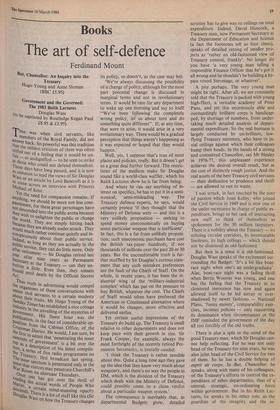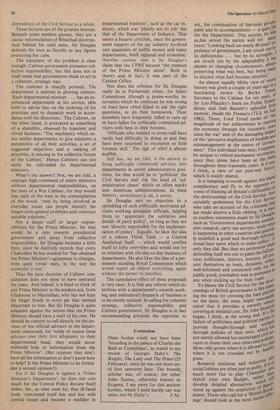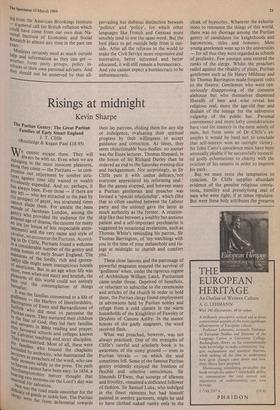Books
The art of self-defence
Ferdinand Mount
Rut, Chancellor: An Inquiry into the Treasury
Hugo Young and Anne Sloman (BBC £5.95) Government and the Governed: The 1983 Reith Lectures Douglas Wass Douglas Wass (to be reprinted by Routledge Kegan Paul £8.95 & £3.95)
Time was when civil servants, like Members of the Royal Family, did not answer back. So powerful was this tradition that the mildest criticism of them was often stifled out of a feeling that it would be un- fair — or undignified — to be seen to strike at those who could not defend themselves. Those days have long passed, and it is now as i common to read the views of Sir Douglas ass or an article by Lord Bancroft as it is come across an interview with Princess
Michael of Kent.
Yet the need for compassion remains. If anything, we should be more not less com- passionate, for these great personages have not descended into the public arena because they wish to enlighten the public or change the world. They are simply hitting back because they are already under attack. They would much rather continue quietly and in- c°°sPicuously about their public service. Indeed, as long as they are actually in the Public service, they can do little more. Only after retirement — Sir Douglas retired last year after nine years as Permanent kecretary at the Treasury — can they un. - bound a little. Even then, they remain °c'und until death by the Official Secrets Act.
the Thus truth in advertising would compel °1.8anisers of these conversations with senior civil servants to a certain modesty about their fruits. Mr Hugo Young of the '?unday Indust— Times has established a nice cottage =y in the unveiling of the mysteries of overnment. His finest hour was the Publication, in the face of considerable op- position from the Cabinet Office, of the the first to admit that 'penetrating the inner top of government' is a bit over the „uP as a description of his latest compila- tion series of five radio programmes on The T. reasurY, first broadcast last spring. e inner sanctum is penetrated only in the sense that visitors may penetrate Churchill's War Room on alternate Thursdays.
ee one has got over the thrill of
Matter actual the actual words of People Who eatter a certain mind-stunning opacity scends. There is a lot of stuff like this (Sir °uglas Wass on how the Treasury changes
its policy, or doesn't, as the case may be): `We're always discussing the possibility of a change of policy, although for the most part potential change is discussed in marginal terms and not in revolutionary terms. It would be rare for any department to wake up one morning and say to itself "We've been following the completely wrong policy, let us about turn and do something quite different". If, at any time, that were to arise, it would arise in a very evolutionary way. There would be a gradual perception that things weren't happening as it was expected or hoped that they would happen.'
Well, yes, I suppose that's true of most places and policies, really. But it doesn't get us a great deal further forward. The restric- tions of the medium make Sir Douglas sound like a world-class waffler, which his Reith Lectures show he is far from being.
And where he can say anything of in- terest on specifics, he has to put it in a semi- ironical, semi-misleading way. The Treasury defence experts, he says, would certainly protest `if they thought that the Ministry of Defence were — and this is a very unlikely proposition — seeking to spend money uneconomically on buying some particular weapon that is inefficient'. In fact, this is a far from unlikely proposi- tion; such uneconomic purchases have cost the British tax-payer hundreds, if not thousands of millions over the past 20 or 30 years. But the uncomfortable truth is fur- ther muffled by Sir Douglas's curious state- ment that any such mistaken preferences are the fault of the Chiefs of Staff. On the whole, in recent years, it has been the in- dustrial wing of the 'military-industrial complex' which has put on the pressure to buy British, whatever the cost. The Chiefs of Staff would often have preferred the American or Continental alternative where it would be cheaper, more effective and delivered earlier.
Yet certain useful impressions of the Treasury do build up. The Treasury is small relative to other departments and does not keep pace with their growth in size. Sir Frank Cooper, for example, always the most forthright of the recently retired Per- manent Secretaries, is brutally candid: 'I think the Treasury is rather sensible about this. Quite a long time ago they gave up the idea that they knew very much about weaponry, and there's no way the people in DM, which is the division of the Treasury which deals with the Ministry of Defence, could possibly come to a clean verdict about a particular weapon system.'
The consequence is inevitably that, as departmental Budgets grow, detailed scrutiny has to give way to ceilings on total expenditure. Indeed, David Hancock, a Treasury man, now Permanent Secretary at the Department of Education and Science (a fact the footnotes tell us four times), speaks of detailed vetting of smaller pro- jects as 'rather an old-fashioned view of Treasury control, frankly'. No longer do you have 'a very young man telling a responsible Finance Officer that he's got it all wrong and he shouldn't be building a by- pass round Stevenage, or whatever'.
A pity perhaps. The very young man might be right. After all, we are constantly told that the Treasury is packed with young high-fliers, a veritable academy of Peter Pans, and yet this enormously able and outstandingly brilliant corps is handicap- ped, by shortage of numbers, from under- taking much detailed analysis of depart- mental expenditure. So the real business is largely conducted by un-brilliant, low- flying Treasury ministers, who have to in- stal ceilings against which their colleagues bump their heads. In the hands of a strong and committed Chancellor, say Mr Healey in 1976-77, this unpleasant experience achieves the desired overall result, but at the cost of distinctly rough justice. And the real assets of the best Treasury civil servants — their dedication to prudence and thrift — are allowed to run to waste.
I was struck, in fact touched by the note of passion which Joan Kelley, who joined the Civil Service in 1949 and is now one of the under-secretaries in charge of public ex- penditure, brings to her task of instructing new staff to think of themselves as spokesmen for the 30 million taxpayers. There is a nobility about the Treasury — its echoing circular corridors, its interminable linoleum, its high ceilings — which should not be dismissed as old-fashioned.
But then in a sense it is old-fashioned. Douglas Wass speaks of the excitement sur- rounding the Budget: 'It's a bit like boat- race night when one's an undergraduate'. Alas, boat-race night was a fading thrill when Bertie Wooster was young, and one has the feeling that the Treasury in its cloistered innocence has now and again allowed itself to be led astray or over- shadowed by newer fashions — National Plans, 'funny money', comparability exer- cises, incomes policies — only reasserting its dominance when circumstances or the IMF reminded the government of the day all too forcibly of the old truths.
There is also a split in the mind of the good Treasury man, which Sir Douglas can- not help reflecting. For he was not only head of the Treasury for nine years, he was also joint head of the Civil Service for two of them. So he has a double helping of esprit de corps. In But, Chancellor, he speaks, along with many of his colleagues, of the Treasury's efforts to control the ex- penditure of other departments, thus of a central, strategic, co-ordinating force within government. But in his Reith Lec- tures, he speaks in his other role, as the guardian of the integrity and the in-
dependence of the Civil Service as a whole.
These lectures are of the greatest interest. Beneath some modern glosses, they are a classic reformulation of Whitehall doctrine. And behind his mild mien, Sir Douglas defends his own as fiercely as any tigress protecting her cubs.
The statement of the problem is clear enough: Cabinet government presumes col- lective responsibility, but this does not in itself mean that governments think or act in a coherent, strategic way.
The contrast is sharply pointed. The department is painted in glowing colours: `Each departmental minister . . . has an ex- perienced department at his service, able both to advise him on the ordering of his priorities and to despatch work in accor- dance with his directions.' The Cabinet, on the other hand, is portrayed as something of a shambles, obsessed by transient and trivial business: 'The machinery which ex- ists within departments to give ministers a perspective of all their activities, a set of suggested objectives and a ranking of priorities, is missing in the collective forum of the Cabinet.' Hence Cabinets can too easily be railroaded by departmental ministers.
What's the answer? Not, we are told, a strategic high command of senior ministers without departmental responsibilities, on the lines of a War Cabinet, for they would lose sight of the trees in the contemplation of the wood: 'only by being involved in everyday issues can people identify the longer-term general problems and construct suitable solutions.'
Not a larger staff or larger respon- sibilities for the Prime Minister, for that would be a step towards presidential government and away from collective responsibility. Sir Douglas hesitates a little here, since he dutifully records that every Chancellor he has worked for 'has obtained the Prime Minister's agreement to changes, even quite trivial ones, in the way the economy is run'.
Thus the pure doctrine of Cabinet con- sultation does not seem to have operated for years. And indeed, it is hard to think of any Prime Minister in the modern era, from Gladstone to Macmillan, who has not kept his finger firmly in every pie that seemed irhportant to him. But Sir Douglas is quite adamant against the notion that the Prime Minister should have a staff of his own. He should be content to call directly on the ser- vices of the official advisers in the depart- ment concerned, for 'while of course these advisers owe their first allegiance to their departmental head, they would never withhold help or information from the Prime Minister'. (But suppose they don't have all the information or don't know how to help? Is the Prime Minister to be forbid- den a second opinion?).
Yet if Sir Douglas is against a 'Prime Minister's Department', he does not care much for the Central Policy Review Staff either, for, as time went by, that ill-fated body 'concerned itself less and less with central issues and became a meddler in departmental business', such as the car in- dustry, which was 'plainly not its job' but that of the Department of Industry. That seems a bizarre criticism, since the govern- ment support of the car industry involved vast quantities of public money and many departments, both regional and economic. Another curious view is Sir Douglas's claim that the CPRS became 'the creature of the Prime Minister alone'. Both in theory and in fact, it was part of the Cabinet Office.
Nor does the solution for Sir Douglas really lie in Parliament either, for Select Committees (though a praise-worthy in- novation which he confesses he was wrong to fear) have often failed to ask the right questions, or do their homework. Their members have frequently failed to turn up or have fallen for politically committed ad- visers with bees in their bonnets.
`Officials who wanted to stone-wall have rarely had difficulty in doing so and they have been surprised to encounter so little forensic skill.' The sigh of relief is almost audible.
Still less, we are told, is the answer to bring politically committed advisers into departments in senior administrative posi- tions, for that would be to 'politicise' the Civil Service and risk the kind of 'ad- ministrative chaos' which so often marks new American administrations. In these matters, smoothness is all, it seems.
Sir Douglas sees no objection to a sprinkling of such politically motivated ad- visers working alongside officials, helping them to 'appreciate the subtleties and details of party policy', so long as they are not 'directly responsible for the implemen- tation of policy'. Equally, he likes the idea of a reborn Think Tank — a Central Analytical Staff — which would confine itself to lofty overviews and would not try to interfere with the day-to-day business of departments. He also likes the idea of a per- manent standing Royal Commission which would report on almost everything, again without the power to interfere.
The cumulative effect of these proposals is very clear. It is that any reform which in- terferes with a department's smooth work- ing and unhindered despatch of business is to be sternly resisted. In calling for coherent strategy, collective responsibility and Cabinet government, Sir Douglas is in fact recommending precisely the opposite: to
The Spectator 10 March 1984 wit, the continuation of baronial govern- ment and its accompaniment — a quiet life for the Department. This system, he tells us,has served the nation well for many years: 'Looking back on nearly 40 years' ex- perience of government, I am struck not by its deficiencies . . . but by its strengths. , am struck too by the adaptability it has shown to changing circumstances, always preserving what was best, but being ready to discard what had become obsolete.' An almost equally blithe view of recent history was given a couple of years ago ill fascinating review by Burke Trend' Secretary to the Cabinet for ten years' °f Sir Leo Pliatzky's book on Public ExPen- diture and Joel Barnett's splendid little memoir, Inside the Treasury (TLS, 16 July 1982). There, Lord Trend spoke of `tw.', magnitude of our achievement in steering the economy through the traumatic years t since the war' and of the damaging irriPac,i of the 'pervasive implication of muddle an mismanagement at the centre of Govern' ment'. This individual tone may, I suppos., be unique to retired permanent secretaries' since they alone have been at the throughout these traumatic years. It is no" which hthink, ieh cs widely view shared. hwof a
u
It is tempting to revolt against this L. complacency and fly to the opposite on treme of blaming all Britain's difficulties on redo post-war history
. d
our uta the shortcomings of the Civil Service. An.e certainly spokesmen for the Civil Seri`..t who take no account of the criticisms 11:01 are made deserve a little ribbing. It is hard to swallow statements made by Sir Dotir,',_ such as 'Government departments con7; sion research, carry out surveys, study !rat. is happening in other countries and gerl.„%a, ly establish a good and thorough irifn“-
I If
tional base upon which to make PolicY",,e0 only they did. But then no profession defending itself sets out to paint the full Pic defending politicians, doctors, lawyers, all her, sent themselves as keen, dynamic, s° the well-informed and concerned only fors as public good; journalists wax as pomP°I.1 any when sticking up for their trade. ,ort, To blame the Civil Service for the s,_11,„ig. comings of British government is like oTies ing the moss for covering the bare Pat° ,ahlY on the lawn; the moss might reas-vety retort that it provides a smooth vet kyris covering at minimal cost. Sir John tbe began, I think, at the wrong end• lt,.es to failure of politicians and political Pardo!. provide thought-through and III. has through policies of their own, whi5 iser- not merely allowed but encouraged aili:cies, vants to foster their own views and Pc' and Moss only grows where it is allowed t°e:iii
grass. thY
wrhaesrse. by it is not crowded out h an Research institutes and industrt is so social lobbies are often just as guilty. Illanct much more fun to play Chancellor than sketch your own Budget, rather h Br will develop detailed alternatives which up against the scepticism of oak- ments. Those who call for a 'British offer. ings' should look at the most recent ing from the American Brookings Institute a general call for British reflation which could have come from our own dear Na- tional Institute of Economic and Social
Research at almost any time in the past ten Years.
Ministers certainly need as much outside help and information as they can get whether from party groups, policy in- stitutes or their own personal advisers. And they should not be unnerved by that all-
pervading but dubious distinction between `politics' and 'policy', for which other languages like French and German more sensibly tend to use the same word. But the best place to get outside help from is out- side. After all the reforms in the world to make the Civil Service more responsive and innovative, better informed and better educated, it will still remain a bureaucracy. And you cannot expect a bureaucracy to be unbureaucratic.








































 Previous page
Previous page